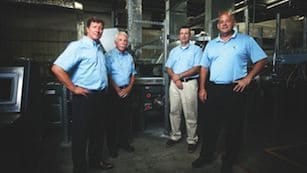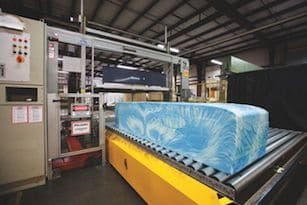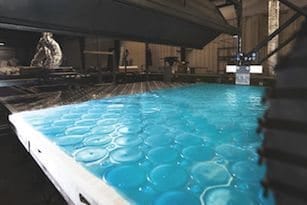BY DOROTHY WHITCOMB
Family-owned business pioneers the way

At the helm Pictured from left are company leaders Lewis Barnhardt, chief operating officer of NCFI’s parent, Barnhardt Mfg. Co.; Steve Riddle, president of NCFI; Chris Bradley, vice president of sales, Consumer Products; and Chip Holton, director of operations.
Mattress-industry supplier NCFI Polyurethanes was among the first in the business to manufacture flexible and rigid polyurethane foams 50 years ago.
The Mount Airy, North Carolina-based company was founded in 1964 as North Carolina Foam Industries when Dr. Harris W. “Ace” Bradley and Barnhardt Mfg. Co., represented by Jacob O. Barnhardt, spearheaded the purchase of flexible urethane foam manufacturing equipment from Essex Wire, a Mount Airy company closing up shop.
“Barnhardt started in cotton batting that was used for seating and cushioning (including in mattresses),” says Lewis Barnhardt, president and chief operating officer of the Charlotte, North Carolina-based parent company. “As Dacron and polyurethane were developed, my grandfather and his brothers saw an opportunity to team up with Ace Bradley and vertically integrate their business into the furniture industry.”
| BRIEFLY | |
| Company | NCFI Polyurethanes |
| Headquarters | Mount Airy, North Carolina |
| Specialty | Flexible foams for the mattress, bedding, furniture, transportation, carpeting and packaging industries, as well as rigid and spray foams for the construction, agricultural and geotechnical industries. |
| Founded | Started by Dr. Harris W. ‘Ace’ Bradley and Jacob O. Barnhardt in 1964. |
| Learn more | www.ncfi.com |
Bradley turned out to be a good man to have on your team. A renowned chemist, he developed flexible polyurethane foam in DuPont’s laboratories. Prior to that, he worked during World War II on the Manhattan Project, a top-secret effort that led to the development of the atomic bomb.
Bradley’s idea: buy the equipment, rent the manufacturing facility from Essex Wire and then rehire all of Essex’s employees. With a ready-made customer base and experienced employees, the fledgling company would be off to a roaring start.
The strategy worked, and “it’s been a whirlwind of growth ever since,” Barnhardt says.
Earning accolades
Another Bradley idea fueled the company’s early growth. He had begun working on a method to streamline flexible polyurethane foam production while working as a research chemist at both DuPont and E.R. Carpenter Co., a multinational foam cushioning producer based in Richmond, Virginia.
He continued that work at NCFI and, in 1964, perfected the “One Shot” flexible foam method, a continuous production process from polymer formation to foaming that became the industry standard. In 2005, the polyurethanes industry recognized the importance of this innovation by inducting Bradley into its Flexible Polyurethane Foam Hall of Fame.
Today, executives at NCFI maintain a studied focus on innovation, niche markets and environmental stewardship. NCFI remains committed to bringing its customers an ever-evolving range of foams and to helping them develop their own innovative products.
In addition to flexible foams, which the company sells to the mattress, furniture, transportation, carpeting and packaging industries, NCFI produces rigid and spray foams, which have wide applications in many areas, including the construction, agricultural and geotechnical industries. This category of foams also has garnered accolades for the company.
“We were chosen in 1980 to supply the foam insulation for Lockheed Martin’s ‘External Tank Program’ for the U.S. Space Shuttles,” NCFI President Steve Riddle says. That was the beginning of a long relationship that resulted in Lockheed Martin awarding NCFI its Supplier Quality Excellence Award in 2010.
Its roots in science and innovation have shaped the company’s corporate culture. “We’ve always been technology-oriented and innovation-driven,” Riddle says. “We have six chemists on staff, and that’s a lot for a company our size. We keep our finger on the pulse of what’s being done everywhere and are currently researching graphite as a flame retardant and working with Natural Foams Technology, an English firm, to put the highest amount of renewable content into our foams.”
NCFI is a privately held, family-owned business, and that, too, has shaped its culture. Barnhardt says: “We know that every quarter is not our last, and think in 20- to 30-year increments. We don’t do the flavor of the day.”
The company’s employees tend to think long-term as well. About half of NCFI’s 299 employees have worked for the company more than 20 years—and several much longer than that.
“I know it sounds like a cliché,” Riddle says, “but we are employee-focused.” That focus extends from lending employees money in times of need to the obvious pride both Riddle and Barnhardt take in their employees’ involvement in safety initiatives and job development.
The company’s business model is equally focused. “We don’t want to be everything to everybody,” Riddle says. “We think in terms of niches (to which) we can bring expertise.”
Barnhardt says: “One of our strengths is that we’d much rather sell to manufacturers that make high-end quality products. We’ve taken the philosophy of going the extra mile to develop those customers.”
Proven results
The approach has paid off. Annual sales at NCFI have grown about 5% year-over-year for the last 10 years. Riddle expects to see that rate accelerate in the next year or so. “We think recovery in the furniture and mattress and bedding industries will drive our annual sales up by 6% to 7%.”
Chris Bradley is vice president of sales for NCFI’s Consumer Products Division, which sells to the mattress, furniture, aviation, athletic and medical industries. (He is not related to Ace Bradley.)
“(Mattresses and bedding accessories) have been our fastest-growing segment for the last three years—20% year-over-year,” he says.
That growth comes in part, Bradley says, from “a strategic decision we made to focus on companies and applications that involve completed foam cores rather than foam as a component in innerspring mattresses.” This has allowed NCFI to develop strategic partnerships with companies that want to develop their own foam beds.
Because NCFI poured more than 220 types of foam this year, it could address a variety of customer needs.
“Because we pour, cut and glue, we have the ability to combine multiple products into one mattress core,” Bradley says. “When customers describe what they want, we can give them five to six options to consider.”
This flexibility also appeals to the company’s many retail customers. NCFI produces mattresses and mattress pads for big-box chains and Internet merchants.
“A tremendous part of our growth comes from partners who sell compressed mattresses that are shipped all over the country,” Bradley says.
The company’s gel-infused memory foam spurred that growth. Because the gel is introduced into the pre-blend process, it does not flake out, Bradley says, resulting in a product that “has a wide temperature range and behaves as it should.”
Environmental mission
NCFI’s newest product, Bio-Lux Max5, sets a new standard for biobased content in flexible foam. Fifty-three percent of the new foam is composed of soy or palm oil, an achievement that earned it the U.S. Department of Agriculture’s “Certified Biobased Product” label. It is the first U.S.-produced foam to receive that designation. (See story on page 45.)
“Reducing energy consumption and carbon emissions and working toward greater sustainability have been part of our process since the early 1990s,” Bradley says. “We’ve consistently maximized the renewable content in our Bio-Lux product line and that doesn’t stop with 53%—real, significant renewable content that our customers can show their consumers.”
NCFI’s commitment to environmental stewardship earned the company the EPA’s “Stratospheric Ozone Protection Award.” Riddle says: “The EPA award says that we stand out as one of the best U.S. companies when it comes to eliminating emissions of ozone-depleting substances. It has always been part of our mission to leave as big a mark as we can with our quality and processes while leaving as small a footprint as we can.”
NCFI pours and fabricates flexible foam at its 500,000-square-foot Mount Airy facility. The company’s 100,000-square-foot plant in Hickory, North Carolina, is used to make cushioning components for upholstered furniture and pillows for bedding.
Scrap material from both plants is sent to the company’s 100,000-square-foot plant in Dalton, Georgia, where it is ground up and recycled into carpet underlayment. A fourth facility in Salt Lake City is used for producing rigid and spray foams.
NCFI’s focus on innovation and insistence on quality have paid off in yet another way. “We have a customer return rate on our compressed mattresses of less than 2%, which is fantastic in the industry,” Bradley says.
What’s ahead
Although NCFI executives are confident about their company’s potential for continued growth, they recognize that continuing challenges must be met. The consolidation of the mattress industry has decreased their pool of customers, Riddle says, because “more people are pouring their own foam.”
Riddle also believes that it is important to carefully evaluate new materials as they become available. “You have to be careful about exaggerated claims that people make about gel, gel foams and other materials. We have to have objective evidence,” he says.
Lewis Barnhardt sees changes in the regulatory environment as particularly challenging. “We have a guy who spends 50% of his time in groups discussing chemical industry issues like off-gassing,” he says.
Both believe that their company brings significant advantages to its market, however.
“Barnhardt Manufacturing has been in business for 115 years,” Barnhardt says. “We have long-term relationships and respect in the industry as an ethical competitor and supply-chain partner. That’s invaluable.”
Riddle sees the company’s long-term focus, coupled with the flexibility inherent in being privately held, as significant strengths. “I can call Lewis and say that I need to do something and have a decision in an hour and I don’t have to meet (the expectations) of a quarterly focus,” he says.
In the end, both believe, it’s all about passion. “Our customers, employees and supply-chain partners are the passion that fuel this organization,” Barnhardt says.






